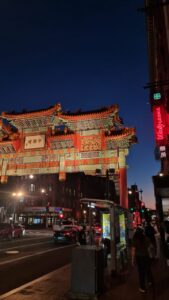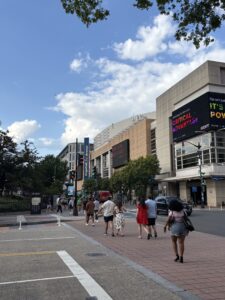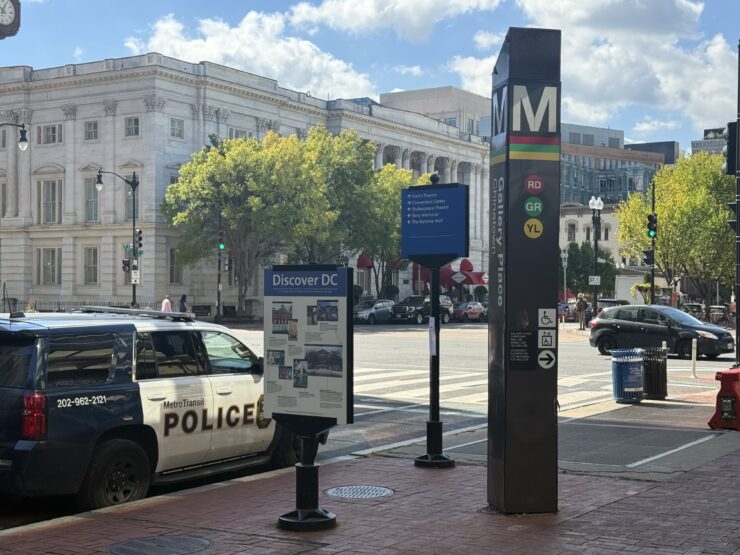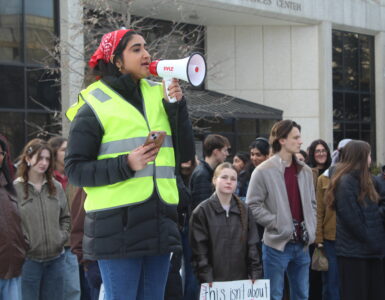The arrival of armed National Guard troops and other federal law enforcement agents in Chinatown alongside local police have left residents and business owners uneasy.
In August, President Donald Trump declared a “crime emergency” in D.C. and deployed federal law enforcement agents and National Guard troops to patrol city streets.
However, while the federal surge ended in early September, its effects have not.

(Luisa Clausen)
Several business owners and pedestrians in the Chinatown and Gallery Place area expressed that unease but declined to speak on the record, saying they feared retaliation for criticizing the police or federal agents. Others who agreed to talk described an atmosphere of tension and confusion during the federal operation and a lingering skepticism toward local law enforcement.
A frequent visitor to the area, who requested anonymity because of safety concerns, said he understands MPD had little choice but to cooperate with federal orders. Still, he said the collaboration blurred lines between local and federal authority.
“Maybe it’s not even anybody’s fault,” he said. “But I do think to an extent that MPD still has to lend a hand and maybe, in some instances, avoid fear tactics when they are unnecessary.”
Another frequent visitor to the area, who also requested anonymity because of safety concerns, said she would like MPD to take a more vocal role in reassuring the Chinatown community that its mission is to serve and not intimidate.
She recalled a recent incident where a woman pushing two children in a stroller was publicly detained at the Metro station for skipping the fare gate.
“I think they could exercise more discretion in situations like that,” she said. “Yes, give her a ticket, but it’s things like that that make people fear local police.”
Thaddeus Johnson, a former law enforcement official in Tennessee and a senior fellow at the Council on Criminal Justice, said the sense of surveillance and mistrust can linger for a long time.
He said the community in Chinatown may not differentiate one law enforcement entity from the other when they see a badge, and actions from one agency can directly impact how citizens see law enforcement in general.
Johnson said it takes more than participating in community events to strengthen the relationship between locals and law enforcement.
He said officers should practice “intelligence– driven patrol” to show the community they are not doing “stops and frisk.”
“Trust is hard to build and easy to break,” Johnson said. “You have to show that you’re responsible, responsive to the needs of people. You’re never supposed to govern in symbolism.”
Although violent crime District-wide went down by 4,760 reported incidents between January 2024 and October 2025, according to the D.C. Crime Cards, Chinatown remains one of the city’s areas of concern.
D.C. Crime Cards data shows theft and robbery remain persistently high in Chinatown, particularly around the Metro area. However, theft rates fell from 13,002 to 9,007 incidents between 2024 and 2025.
Johnson said the Asian community was targeted during the COVID-19 pandemic in 2020, and though he said things have improved, recent history combined with the federal takeover could trigger fear and mistrust.

Luisa Clausen
Nearly 40% of over 3,500 arrests made since the operation began in early August were immigration-related, according to the Associated Press. Johnson said though MPD didn’t perform those actions, local communities may not distinguish one authority from the other.
“All we see is a badge of enforcement,” Johnson said. “So, how other agencies act impacts how you feel, even about the officers you see day to day walking in your community.”
The DowntownDC Business Improvement District did not respond to questions in time for publication.
MPD First District Capt. Paul Hrebenak said a large part of policing is training MPD officers on community policing and identifying biases. He said MPD focuses on having a fair balance and check system so the community feels like they are “treated fairly.”
However, he said he understands how the federal takeover may have impacted the trust in local enforcement.
“I can definitely understand that there’s been a shift, perhaps, as this takeover has happened with the community’s trust in law enforcement,” Hrebenak said. “But I think in the long term and the medium term, things really haven’t changed that much in our response from neighborhood to neighborhood.”















Add comment